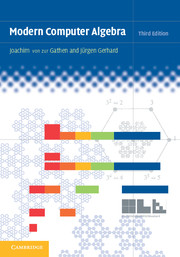Book contents
V - Hilbert
Published online by Cambridge University Press: 05 May 2013
Summary
David Hilbert (1862–1943) grew up in Königsberg, then capital of East Prussia and now Kaliningrad in Russia, in an upper middle-class family; his father was a judge. The town had been home to the philosopher Immanuel Kant, to Leonard Euler, whose solution to the riddle of how to cross its seven bridges across the river Pregel without re-using one became a starting point for graph theory and topology, and to C. G. J. Jacobi.
After an unimpressive school career, he studied at the university to graduate with his doctoral thesis on invariant theory in 1885. He worked in this area until 1893, proving among other things the Hilbert basis theorem saying that any ideal in a polynomial ring (in finitely many variables over a field) is finitely generated (Theorem 21.23), and introducing the Hilbert function of algebraic varieties.
Two further results from his “multivariate polynomial phase” are relevant to the subject matter of this text: firstly Hilbert's Nullstellensatz (1890), which says that if a polynomial g vanishes on the set of common roots of some multivariate polynomials f1,…,fs over ℂ, then some power ge is in the ideal 〈f1,…,fs〉 (see Section 21.7). Secondly, Hilbert's irreducibility theorem (1892), stating that for an irreducible polynomial f ∈ Q[x,y], the univariate polynomial f(x,a) ∈ Q[x] is irreducible for “most” a ∈ ℤ. This sounds useful for reducing bivariate to univariate factorization. Unfortunately, no efficient versions of “most” are known, but, fortunately, such versions are known for reducing from many to two variables (Section 16.6).
Information
- Type
- Chapter
- Information
- Modern Computer Algebra , pp. 585 - 590Publisher: Cambridge University PressPrint publication year: 2013
